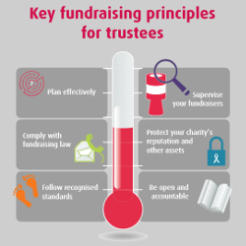The Charity Commission revised its guidance on fundraising too fast, and does not properly explain its own role in the new regulatory structure, NCVO said in a consultation response submitted yesterday.
In its response to the Commission’s calls for response on its proposed revisions for CC20, NCVO said the draft guidance does not properly explain the Commission’s proposed ‘backstop’ role as part of the changes being made to fundraising self-regulation.
“NCVO’s main concern about the guidance and the current consultation is that the revision has been undertaken too soon, as the new regulatory structure is still being established," the response says.
“This means that the Commission’s regulatory involvement in cases of fundraising malpractice and its expectations with regards to the new Fundraising Regulator are not addressed.
"In particular, the draft new guidance does not outline in sufficient detail the cases and issues that are relevant to the Charity Commission as the ‘backstop’ statutory regulator, and which will raise its regulatory concerns or trigger the use of its powers.”
NCVO said it is also concerned that, once the Code of Fundraising Practice is handed over to the Fundraising Regulator, the guidance will need to be revised again. NCVO said that it anticipates it is “likely that considerable changes will need to be made to the Code as the new regulatory framework develops”.
Fundraising think-tank Rogare urged the Charity Commission to “revisit the existing guidance and see how this can be strengthened or streamlined”.
Rogare argues that the Commission has reduced its draft CC20 too much and “does not provide trustees with a comprehensive understanding of what they need to know in order to act” on the ‘six principles’ it says trustees must follow when it comes to fundraising.
Ian MacQuillin, director of Rogare, said: “The existing CC20 is a really excellent document that already gives trustees all the information they need to have to make good, well-informed decisions about fundraising. The revised guidance shifts the focus from what they need to know to what they need to do, and the new six principles for trustee action are a powerful addition.
"But trustees will make a poor job of executing those six principles if they don't have all all the information they need, and this is now a real possibility since so much detail, advice and information has been cut out – apparently to make the guidance more readable.”
The Institute of Fundraising and PFRA have welcomed the revision and said the new draft was “notably stronger than the current version”.
However, the IoF and PFRA consultation response said that the revised CC20 must not “result in individuals being unnecessarily deterred from joining boards by making it seem overly hard or burdensome to discharge their duties.
“Risk must be appropriately managed in the best interests of the organisation, the tone of the guidance may result in trustees being so risk averse that it stymies the innovation and investment in fundraising that is necessary for organisations to raise funds”.
The consultation process for CC20 closed yesterday.









